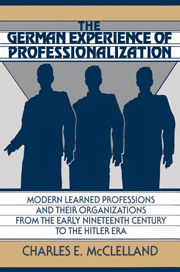 The German Experience of Professionalization
The German Experience of Professionalization Book contents
- Frontmatter
- Contents
- Acknowledgments
- Abbreviations
- Part I The problem of professions in Germany
- Part II The transition to modern professions in the early nineteenth century
- Part III Unified professions in a unified Germany?
- 5 The organization of the “free” professions: medicine, law, engineering, and chemistry
- 6 Organization of state-service professions: teachers and the clergy
- 7 Professional credentials in the new Reich
- Part IV Breakthroughs and breakdowns: The professions enter the era of cartels and unions
- Part V The Weimar era
- Part VI The fate of professions under and after fascism
- A word about sources
- Index
7 - Professional credentials in the new Reich
Published online by Cambridge University Press: 06 July 2010
- Frontmatter
- Contents
- Acknowledgments
- Abbreviations
- Part I The problem of professions in Germany
- Part II The transition to modern professions in the early nineteenth century
- Part III Unified professions in a unified Germany?
- 5 The organization of the “free” professions: medicine, law, engineering, and chemistry
- 6 Organization of state-service professions: teachers and the clergy
- 7 Professional credentials in the new Reich
- Part IV Breakthroughs and breakdowns: The professions enter the era of cartels and unions
- Part V The Weimar era
- Part VI The fate of professions under and after fascism
- A word about sources
- Index
Summary
In the preceding chapter, frequent references were made to education, certification, examinations, and other forms of credentialing that preoccupied most of the new professional organizations in the German Reich. These issues are rarely far from the central concerns of any professional organization; but they were particularly burning ones in the Wilhelminian era. Nor did they cease to be important after the turn of the century, and we shall have to return to them in subsequent chapters. But the beginning of the twentieth century did mark a certain cesura in some ways, bringing to a climax a number of separate or intertwined debates that had been swirling for decades in the hot currents of Imperial German rhetoric. This chapter focuses upon this highly charged area of professional concern and activity separately from the others discussed in Chapters 5 and 6.
In treating the disparate policies and desiderata of the German professions together and topically here, I hope to show certain patterns that they shared in their strategies for changes in educational structures, examinations, and related aspects of the complex system of credentials based on expert knowledge that is the heart of modern professional self-justification. Thus, the chapter will deal with a series of topics, ranging from preprofessional education (e.g. the debate between “humanists” and “realists” about higher schools) to the admission of women to professions. Within each topic, the positions of each major professional group will be discussed.
- Type
- Chapter
- Information
- The German Experience of ProfessionalizationModern Learned Professions and their Organizations from the Early Nineteenth Century to the Hitler Era, pp. 107 - 128Publisher: Cambridge University PressPrint publication year: 1991
